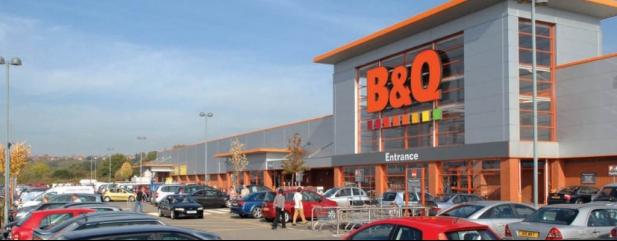Archived article
Please note that tax, investment, pension and ISA rules can change and the information and any views contained in this article may now be inaccurate.
A brighter outlook for property makes this 5% yielding trust a bargain

The outlook for UK commercial property has improved in the wake of the roll-out of vaccines and as workers return to the office. However, this brighter picture and a strong historic track record is not reflected in the current discounted valuation at Standard Life Investments Property Income (SLI).
The recovery in real estate as we emerge from the pandemic is likely to be uneven and we think buying this investment trust, which trades 17.1% below its net asset value and offers a near-5% yield, is a smart way to play property. Steered by Jason Baggaley for the past 15 years, it has delivered excellent returns over the long term.
Investec says: ‘Over 10 years, the NAV total return compound annual growth rate is 10%; this is materially higher than the annualised NAV total returns of 4.6% and 3.3% recorded by the AIC property direct UK commercial sector and IA open-ended UK commercial property sector respectively.’
HOW HAS IT BEEN SO SUCCESSFUL?
The success of Standard Life Investments Property Income has been built on several strands. These include clever management of the portfolio, namely buying and selling assets to position the trust to capitalise on shifting trends.
For example, the portfolio has seen increased exposure in recent years to logistics assets which are increasingly in demand from a growing e-commerce space. This shift was accelerated by the pandemic but is something the trust picked up on some time ago.
As of 30 June 2021, the trust had a 50.7% weighting towards industrial assets. Its exposure to structurally challenge high street retail is just 2%.
There has also been an emphasis on asset management, encompassing initiatives like upgrading and reletting assets to boost their value.
Baggaley’s commitment to remaining on the front foot is reflected in a well-developed ESG (environmental, social and governance) strategy. The trust recently acquired 1,447 hectares of rough grazing and open moorland in the Cairngorm national park for £7.5 million as part of its commitment to achieving net zero status.
He tells Shares that the way sustainability is coming to the fore ‘is a really interesting feature of the recovery’.
ESG FOCUS
‘It’s not just about the E of ESG either. Obviously environmental performance is really important but it’s also about the appeal of the building to staff,’ Baggaley adds. ‘If you want to encourage someone who is sat on the sofa (at home) to sit at their desk (in the office) you have to create the right environment.’
When Shares spoke to the fund manager, he had just come from a three-hour meeting with the trust’s asset management team to look at all the office assets and determine what would be required to bring them up to modern standards, how much it would cost and whether it is possible.
‘We will have to be more discerning about what assets we hold. We sold four offices this year, in each case they were perfectly decent properties which had performed well but it was about how much we were going to have to spend in three to four years,’ he says.
This refining of the portfolio is also being pursued in the industrial component where some multi-let industrial assets were recently offloaded. Baggaley saw these assets as more vulnerable to economic blowback from the pandemic, given a bias towards small and medium-sized tenants.
FINANCIAL FIREPOWER
At 30 June 2021, the loan-to-value was 17.6%, among the lowest of its immediate peer group. This leaves it with firepower of £80 million to put towards new investments.
According to Baggaley this money won’t be put to work in areas like high street or shopping centre retail which in his words still seem ‘very challenged’.
The focus instead will be on retail warehouses, such as a West Midlands asset in its portfolio leased to B&Q for £19.5 million in 2020.
Baggaley is also looking at speculative developments in the logistics space, which arguably carries greater risk than buying already constructed assets but can generate higher yields and allow units to be built to certain specifications to factor in things like energy efficiency.
The investment trust has also allocated cash to share buybacks, buying 7.4 million shares in the first half of the year, which should help narrow the current discount to NAV.
For many years before the pandemic, Standard Life Investments Property Income traded at a premium to net asset value, so the current large discount is somewhat of an anomaly.
Investec comments: ‘A strong fundamental proposition is enhanced by the current discount, which, given the track record, we struggle to reconcile. We expect the company to return to a premium rating in the months ahead.’
Important information:
These articles are provided by Shares magazine which is published by AJ Bell Media, a part of AJ Bell. Shares is not written by AJ Bell.
Shares is provided for your general information and use and is not a personal recommendation to invest. It is not intended to be relied upon by you in making or not making any investment decisions. The investments referred to in these articles will not be suitable for all investors. If in doubt please seek appropriate independent financial advice.
Investors acting on the information in these articles do so at their own risk and AJ Bell Media and its staff do not accept liability for losses suffered by investors as a result of their investment decisions.
Issue contents
Editor's View
Feature
Great Ideas
- China exposure is a key risk for Lindsell Train Equity Fund
- Alliance Pharma's growth potential remains underappreciated
- Why this Japanese trust has gained 15% in a month
- Close to 50% gain from Equals since April, more to come?
- Want Asia exposure but worried about China? Try Vietnam
- A brighter outlook for property makes this 5% yielding trust a bargain

 magazine
magazine








